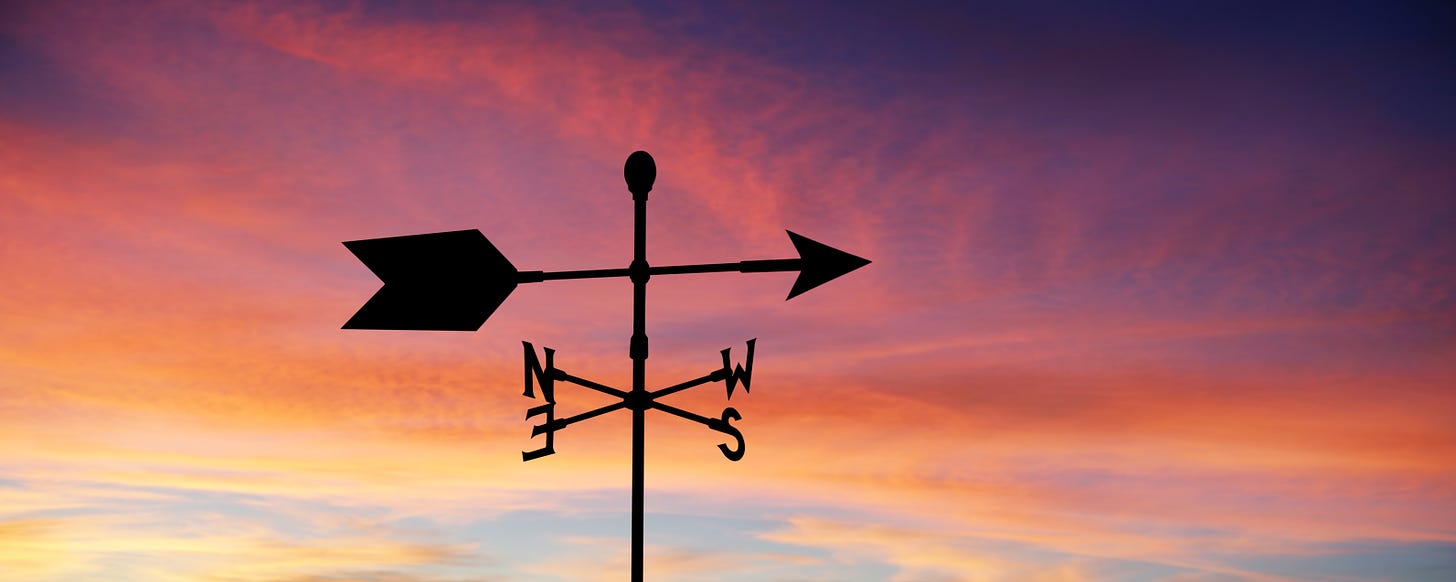Let’s start today’s post with a photograph from Iceland that could double as political analysis for the United States:
We often look at flags to give us tangible proof of the directional force of wind. But as you can see, the two Icelandic flags captured here convey contrasting circumstances. It’s a testimony to the physical realities of that beautiful wind-swept island. It’s also a useful note of caution that sometimes the answer to the question, “Which way is the wind blowing?” isn’t that simple.
The notion of the wind blowing in a single direction is often used as a metaphor for competition, especially in politics. We speak of “headwinds,” or which candidate has the “wind at their back.” And we try, through polling and supposition, to determine momentum and the force of support — once again, which way the wind is blowing.
Sometimes this is a useful lens through which to view a political environment. There can be times when the force of public opinion is so strong in a single direction that you have “wave elections” (many waves are caused by wind). But in reality all elections are competitions of forces pushing in different directions. Even the most popular candidates have their detractors. And the same qualities that might excite large swaths of the voting public for one politician invariably push other voters in the opposite direction.
I’ve been covering politics for 72 years (!), and in all that time there seldom if ever has been as complicated a political picture as what we have today. If you were to ask me, “Which way is the wind blowing?” I would respond with a simple but perhaps unsatisfying answer: everywhere.
By traditional metrics, the looming midterm elections would shape up to be a disaster for the Democratic Party, and indeed that is a possible outcome.
We have a level of inflation we haven’t seen in decades. And this is particularly visible at the gas pump, which means every time anyone passes a gas station they are reminded of the high prices (and people often drive by several gas stations through the course of a day).
We have a pandemic that is still making people sick, upending plans, and disrupting our economy, as well as the rest of the world’s — even though Americans want to pretend it is over.
Speaking of the world, we have uncertainty overseas, particularly a bloody war in Ukraine that further exacerbates our spiking energy prices and a general sense of foreboding and unease.
Even though Democrats hold the presidency and (nominally) both houses of Congress, there is a perception that the party has failed to deliver on many important promises. And this has led to the expected infighting between factions of the party over who is to blame. Many point fingers at those two recalcitrant senators whose names are linked in more news articles than Bonnie and Clyde. Joe Manchin’s and Kyrsten Sinema’s refusal to ditch the filibuster has led to paralysis in the Senate on key bills from voting rights to abortion rights.
All of this dissatisfaction has caused President Biden’s job approval ratings to drop so steeply you could fashion an Olympic downhill ski run on their decline. A recent New York Times poll suggests most Democrats don’t want Biden to run again.
Ordinarily, these factors would likely add up to gale-force winds blowing in the direction of Democrats getting walloped up and down the ballot this November.
But these times are different.
Because there’s a heckuva lot of wind blowing in the opposite direction.
First is the Supreme Court, where at least five justices are acting like their own little hurricanes (to continue to stretch the wind metaphor), tearing apart the structure of American law, public opinion be damned. Hurricane Thomas even wrote publicly what many expect — that they are nowhere near done after their rulings on abortion, guns, voting rights, and the environment. Gay marriage, contraception, the right to privacy — everything is in their sights, including perhaps the fair functioning of American democracy.
There is also the lingering shadow (or perhaps more apt, stench) of the previous administration. President Trump is even less popular than President Biden. In the same New York Times poll where Biden is polling in the low 30s, the current president is still beating the one he defeated in 2020. And with the investigation of the January 6 committee leading to more bombshells than a season of "The Sopranos" (and with the same mafia vibe), the horrors of the Trump cabal aren’t leaving the national consciousness anytime soon.
Add to this the fact that Republican voters have chosen many extremist candidates (often promoted by Trump) in primaries, and you have more proof that the party is doubling down in ways that are unpopular with the public at large.
All this adds up to, well, who exactly knows? That’s why we have elections.
Which way is the wind blowing?
Will voters beset by rising prices take it out on the "ruling" party?
Will the Supreme Court’s dive into the reactionary deep-end spur voters to show their disgust at the polls?
Will Democratic voters frustrated by a lack of action on big issues they care about stay home out of frustration?
Will candidates like Herschel Walker in Georgia and Mehmet Oz in New Jersey (I mean Pennsylvania) sink Republican hopes in the Senate?
Will apathy or anger be the driving narrative?
The answer to all of these questions is probably some version of yes and no. The swirling wind makes political prognostication particularly problematic. And there is plenty of time for the winds to shift again.
When the November elections are over, which way do you think the wind will have blown?





"We have a level of inflation we haven’t seen in decades.". It's important that we are clear in the message that inflation and price gouging at the pump has less to do with the administration and more to do with capitalism gone awry - not coincidentally, a cornerstone of the Republican party. Could it be that corporations are intentionally driving up prices and causing inflation specifically to manipulate a change in leadership, perhaps one that is more lenient to billionaire's and corporate campaign contributors? If so, let's call this what it truly is: racketeering.
I tend to be cautiously optimistic. I have never had so many female friends and acquaintances this full of rage. I don't think the Republicans realize the depth of the rage, frankly. I am woman, hear me roar.